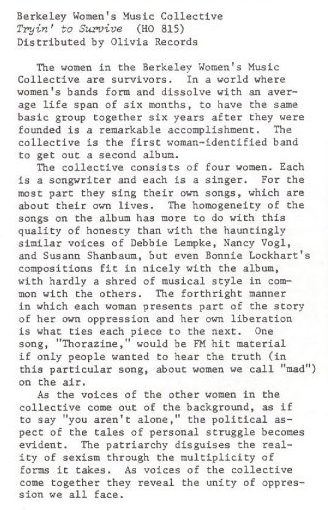Women in the Women’s Liberation movement sought songs which spoke to their experience. Despite being written about personal experiences, the music of The Berkeley Women’s Music Collective was inherently political. This review of the band’s second album highlights the connection many listeners felt towards the band’s songs, which spoke to every woman’s personal oppression and struggle for liberation.
*
In separate recent conversations with Nancy Vogl, Suzanne Shanbaum and Debbie Lempke, the band members recall the emerging women’s movement and what it felt like to write songs for the it.
Nancy: There was no culture of women that we knew; we’d all grown up under patriarchy and a very restrictive value system of what was to be valued and what wasn’t. There were a bunch of us misfits however, who felt like everything we valued was rendered invisible by the dominant culture. I would say the majority of us were 21 to 25, and we had all grown up as boomers after World War II in an expanding economy.
By the late ’60s and early 70’s, the United States was heralding its domination over the entire world. We had an expanding economy, public education that was still a priority and not a threat. We had advantages to healthcare. If you were in the middle and upper class you basically had what you needed.
Men had permission to assume their role as young masters of the universe, and many of us, collectively, saw that we didn’t. We had so many women who had grown up with a greater degree of freedom and privilege thinking that we also had the keys, and then almost at once, together, we realized that the keys were not on our ring; they were on our brothers’, our uncles’, etc.
We all seemed to be coming of age at the same time. Once we started to gather together, musicians turned out to be the voice of expressing everything that women were feeling. The arts became our way of sharing our culture in the classic tradition of the arts and storytelling – troubadours shared the stories of other towns, other important information. Women’s bookstores were opening, women’s concert production and other events. We wanted to do everything on our own without asking men’s permission for it.
Suzanne: Our audience was made up of people who lived all over the country and were feeling like our music was expressing how they felt about their lives, whether it was psychiatric assault, coming out, or a love song to another woman. Regardless of the specific subject, our music spoke to them in a certain kind of way.
I am the president of my synagogue. One of our members who’s in her eighties told me that she was living in Texas when our second album, Tryin’ To Survive, came out. She described what it was like for that community in Texas to see our album cover and how mind blowing and affirming it was for them. Our album had a picture of the band members in suits on the front, and a similar picture on the back in dresses.
Lily: Do you think that music was an effective way to get your message out into this movement and really kind of fuel the people in it.
Debbie: Oh definitely because at that time it wasn’t something you could hear on the radio and a regular record company’s not going to pick that up. And, music was more important, I think then, then now. Like then I mean, you would hang on the lyrics of certain people you followed. It was a unifying experience. It’s like you had the people out there who needed and wanted, and when they heard it, they didn’t know what they wanted, but when they heard it, they were like, “Oh my God, that’s how I felt.”
So it was back and forth between us. It was like we were revealing ourselves, and they were like, “Oh my God. Yeah.” And there was an exchange in the arts going between the music and the writers and the publishers and the artists. There was art that was speaking to that, visual arts, paintings. There was the professors, the people who went the academic route, it was all going back and forth to each other.
*
This review also praises the band’s longevity, noting that “the collective is the first woman-identified band to get out a second album.” For more on how the band was able to stay together see the Paid My Dues article written by Suzanne Shanbaum.
